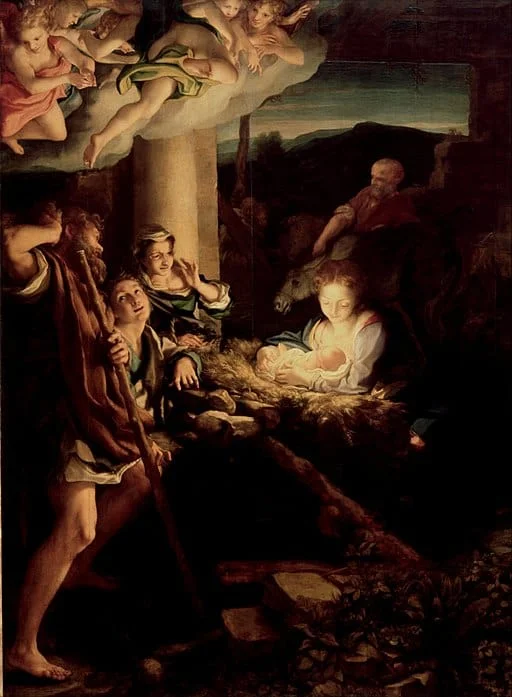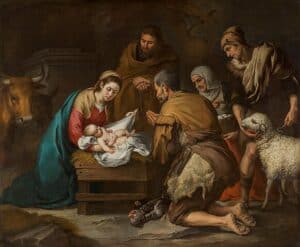Birth and Nativity of Jesus Christ

Introduction to the Nativity of Jesus
In the heart of the Joyful Mysteries, the birth of Jesus unfolds as a moment of divine grace, radiating with profound significance for Christians. This sacred event from Luke’s Gospel marks the birth of Jesus Christ in Bethlehem, fulfilling ancient prophecies and illuminating the world with the Light of God. The Virgin Mary, the humble handmaiden chosen by the Almighty, and Joseph, the righteous carpenter, journeyed to Bethlehem for the census.
Arriving in Bethlehem, they faced the challenge of finding shelter, yet the humble stable became the sacred scene where the Son of God entered the world. Amidst the stillness of the night, angels heralded this wondrous birth to shepherds, inviting them to witness the Savior’s arrival. Guided by a brilliant star, wise men from the East brought gifts to honor the newborn King.
In the simplicity of the manger, divinity embraced humanity, and the world beheld the miracle of the Nativity. This mystery encapsulates the essence of God’s love, manifested in the vulnerable form of a newborn, inviting all to contemplate the profound mystery of the Incarnation. As we reflect on the third Joyful Mystery, we are drawn into the warmth of the Holy Family’s love and the transformative power of God’s entry into human history.
Scriptures of the Birth of Jesus Christ
And it came to pass, that in those days there went out a decree from Caesar Augustus, that the whole world should be enrolled. This enrolling was first made by Cyrinus, the governor of Syria. All went to be enrolled, everyone into his own city.
Joseph also went up from Galilee, out of the city of Nazareth into Judea, to the city of David, which is called Bethlehem: because he was of the house and family of David, to be enrolled with Mary his espoused wife, who was with child. And it came to pass, that when they were there, her days were accomplished, that she should be delivered. And she brought forth her firstborn son, and wrapped him up in swaddling clothes, and laid him in a manger; because there was no room for them in the inn.
And there were in the same country shepherds watching, and keeping the night watches over their flock. And behold an angel of the Lord stood by them, and the brightness of God shone round about them; and they feared with a great fear. And the angel said to them: Fear not; for, behold, I bring you good tidings of great joy, that shall be to all the people: For, this day, is born to you a Savior, who is Christ the Lord, in the city of David. And this shall be a sign unto you. You shall find the infant wrapped in swaddling clothes, and laid in a manger. And suddenly there was with the angel a multitude of the heavenly army, praising God, and saying: Glory to God in the highest; and on earth peace to men of good will.
And it came to pass, after the angels departed from them into heaven, the shepherds said one to another: Let us go over to Bethlehem and let us see this word that is come to pass, which the Lord hath shewed to us. They came with haste; and they found Mary and Joseph, and the infant lying in the manger. And seeing, they understood of the word that had been spoken to them concerning this child. And all that heard, wondered; and at those things that were told them by the shepherds. But Mary kept all these words, pondering them in her heart. And the shepherds returned, glorifying and praising God, for all the things they had heard and seen, as it was told unto them.
And after eight days were accomplished, that the child should be circumcised, his name was called JESUS, which was called by the angel, before he was conceived in the womb. (Luke 2:1-21)
Scripture Commentary
Luke 2:1-21 recounts the familiar Christian tradition of Christmas and cherished narrative of the nativity and birth of Jesus Christ in Bethlehem. This passage is central to the Christian celebration of Christmas and carries profound theological significance. Let’s explore a commentary on this passage:
Verses 1-7: The Birth of Jesus Christ in Bethlehem
The opening verses set the historical context, highlighting the decree from Caesar Augustus, the Roman emperor, for a census of the entire Roman world that required people to register in their ancestral towns. This directive leads Joseph and Mary to travel from a town called Nazareth to Bethlehem, fulfilling the prophecy of Micah 5:2 (“And thou, Bethlehem Ephrata, art a little one among the thousands of Juda: out of thee shall he come forth unto me that is to be the ruler in Israel: and his going forth is from the beginning, from the days of eternity.).
The humble circumstances of Christ’s birth in a manger due to the lack of lodging accentuate the theme of the Messiah’s unexpected and humble entry into the world.
Verses 8-14: The Shepherds and the Angelic Announcement
The scene moves to the fields outside Bethlehem, where shepherds are keeping watch over their sheep. Suddenly, an angel appeared, bringing a message of incredible joy: the long-awaited Savior had been born. This moment is filled with divine meaning, as it signifies God revealing himself to humanity and fulfilling ancient prophecies.
The heavenly host praising God declares, “Glory to God in the highest, and on earth peace among those with whom he is pleased.” This statement is profound, highlighting the cosmic importance of Jesus’ birth. It connects his arrival to the glory of God and promises peace to those who receive him with open hearts. This scene emphasizes the heavenly significance of Jesus’ birth and foreshadows the peace and salvation he will bring to the world.
Verses 15-20: The Shepherds' Response

The shepherds, recipients of this divine message, promptly go to Bethlehem to see the newborn Christ child. Their witness to the fulfillment of the angel’s words underscores the authenticity of the events. Their response is marked by awe and glorifying God, and they share the news of the birth of Jesus, leaving those who hear amazed and to be a witness for all the world to see.
Significance of the Birth of Jesus
This passage holds several theological implications:
Fulfillment of Prophecy
The birth of Jesus is often seen as fulfilling several prophecies from the Old Testament, the sacred writings of the Jewish people before Jesus was born. One of the most famous prophecies is in the book of Isaiah, chapter 7, verse 14, which says: “Therefore the Lord himself will give you a sign: The virgin will conceive and give birth to a son and will call him Immanuel.“
This prophecy speaks about a virgin giving birth to a son, often interpreted as foretelling the miraculous conception of Jesus by the Virgin Mary.
Another significant prophecy is found in the book of Micah, chapter 5, verse 2, which says: “But you, Bethlehem Ephrathah, though you are small among the clans of Judah, out of you will come for me one who will be ruler over Israel, whose origins are from of old, from ancient times.“
This prophecy indicates that the Messiah believed to be Jesus by Christians, would be born in Bethlehem, which indeed happened according to the New Testament accounts.
These are just a couple of examples, but there are other passages in the Old Testament that Christians interpret as pointing towards the birth of Jesus. The birth of Jesus is seen as the fulfillment of these prophecies, showing that Jesus was the long-awaited Messiah promised by God in the Old Testament.
Incarnation and Humility of the Birth of Jesus
Incarnation
The term “incarnation” comes from the Latin word “incarnatio,” which means “to become flesh.” In Christian theology, the Incarnation refers to the belief that Jesus, who is divine, took on human flesh and became fully human while retaining his divine nature. This concept underscores the belief that God chose to enter into human history in the person of Jesus Christ. The birth of Jesus, as recounted in the Gospels of Matthew and Luke, is seen as the moment when this Incarnation took place. Through the Incarnation, Christians believe that God became accessible to humanity in a tangible and relatable way, bridging the gap between the divine and the human.
Humility
The birth of Jesus also exemplifies the virtue of humility. Despite being the Son of God, Jesus was born in humble circumstances and laid in a manger because there was no room for them in the inn. This humble beginning sets the tone for Jesus’ life and ministry, characterized by servanthood and selflessness. Throughout his teachings and actions, Jesus consistently emphasized the value of humility, teaching his followers to prioritize others above themselves and to serve one another with love and compassion. The humility of Jesus is perhaps most vividly portrayed in the account of his washing the disciples’ feet, a symbolic act of humble service that challenges societal norms and underscores the importance of humility in Christian discipleship.
Angelical Proclamation
The angelic proclamation of the birth of Jesus holds great significance in Christian theology and tradition.
Divine Announcement
The angelic proclamation signifies that the birth of Jesus is not merely a human event but a divine one. In the Gospel of Luke, angels appear to shepherds in the fields to announce the birth of Jesus, proclaiming, “Glory to God in the highest, and on earth peace among those with whom he is pleased.” This divine announcement emphasizes the heavenly nature of Jesus’ birth and highlights God’s active involvement in human affairs.
Revelation of God’s Plan
The angelic proclamation reveals God’s plan of salvation for humanity. By announcing tThe angelic proclamation conveys a message of hope and joy to all people. The angels declare that the birth of Jesus brings “good news of great joy that will be for all the people.” This inclusive message signifies that the salvation offered through Jesus is not limited to a particular group or nationality but is available to all who receive it. It reflects the universal scope of God’s love and the inclusive nature of His kingdom.
Good News for All
The angelic proclamation conveys a message of hope and joy to all people. The angels declare that the birth of Jesus brings “good news of great joy that will be for all the people.” This inclusive message signifies that the salvation offered through Jesus is not limited to a particular group or nationality but is available to all who receive it. It reflects the universal scope of God’s love and the inclusive nature of His kingdom.
Call to Worship and Witness
The angelic proclamation serves as a call to worship and witness. Upon hearing the angels’ message, the shepherds immediately go to Bethlehem to see the newborn child. Their response of faith and obedience demonstrates the proper human reaction to the revelation of God’s work in the world. Similarly, the angelic proclamation invites believers to worship Jesus as Lord and to share the good news of His birth with others, fulfilling the Great Commission to make disciples of all nations.
The angelic announcement underscores the transcendent and cosmic dimensions of the birth of Jesus. The declaration of peace on earth signals the advent of reconciliation between God and humanity through the coming Messiah.
Shepherds as Witnesses
The choice of shepherds as the first witnesses to the birth is significant. In the societal context of that time, shepherds were considered lowly and marginalized. This choice underscores the inclusive nature of the Gospel message, extending God’s grace to all.
Response of Awe and Worship
The shepherds’ immediate response of awe, glorifying and praising God, is a model for believers. Their role as messengers and sharing the news echoes the Great Commission to spread the Gospel.
In summary, Luke 2:1-21 narrates the birth of Jesus in Bethlehem, intertwining historical events with divine revelation. The passage emphasizes the fulfillment of prophecy, the humility of the Incarnation, the cosmic significance of Jesus’ birth, and the inclusive nature of the Gospel. The shepherds’ response serves as an example of humble worship and immediate proclamation, encapsulating the joyous essence of the Christmas narrative.
Feast of the Birth of Jesus Christ
The feast day for the birth of Jesus is celebrated on December 25th, commonly known as Christmas Day. This day marks the birth of Jesus Christ and is observed by Christians worldwide. It is a time for joyous celebrations, gift-giving, and remembering the story of the birth of Jesus in Bethlehem, as recounted in the Bible.
Download our Joyful Mysteries pdf Document
We have a Joyful Mysteries pdf available for your use. It is free to download and share. It can be printed and used to pray the Rosary and is an excellent aid for anyone, especially beginners. The author still uses them to this day.
To view our Joyful Mysteries pdf page, click the link. To go straight to the pdf, click the button below.

Charles Rogers is a resident of South Carolina and a retired computer programmer by trade. Raised in various Christian denominations, he always believed in Jesus Christ. In 2012, he began experiencing authentic spiritual encounters with the Blessed Virgin Mary, which led him on a seven-year journey at her hand, that included alcohol addiction, a widow maker heart attack and death and conversion to the Catholic Faith. He is the exclusive author and owner of Two Percent Survival, a website dedicated to and created in honor of the Holy Mother. Feel free to email Charles at twopercentsurvival@gmail.com.

We strive to provide the most complete and highest quality material we can for you, our readers. Although not perfect,
it is our desire and prayer that you benefit from our efforts.

